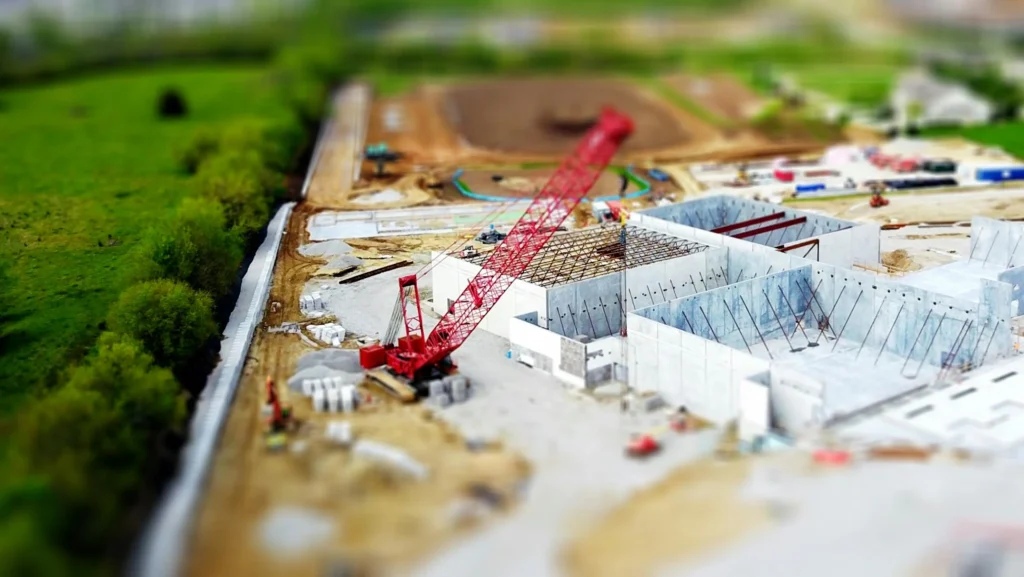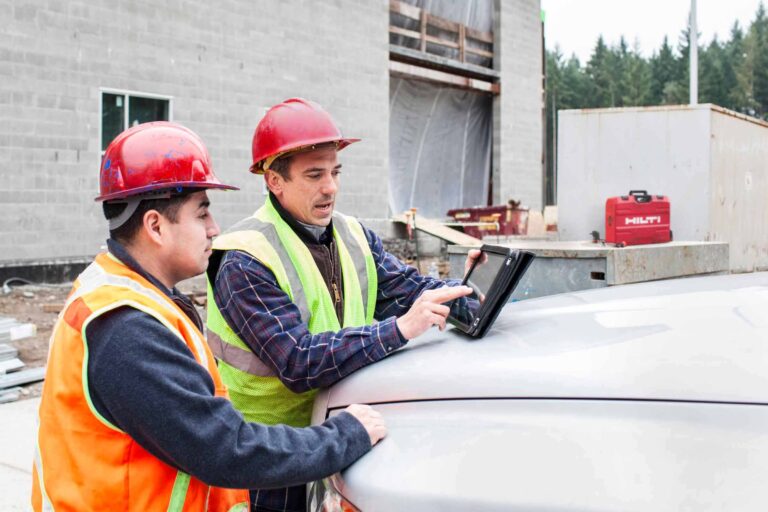
The construction industry has long been known for its complexity, delays, cost overruns, and risk management challenges. However, the adoption of Artificial Intelligence (AI) and Machine Learning (ML) is transforming construction project management, leading to increased efficiency, accuracy, and overall project success. From automating mundane tasks to predictive analytics, AI and ML are helping construction managers make data-driven decisions, mitigate risks, and optimize resource allocation.
With rapid technological advancements, AI applications in construction are expanding, reshaping traditional workflows, and fostering innovation. The integration of AI is not just improving project efficiency but also revolutionizing the way stakeholders collaborate, plan, and execute projects. This blog will explore how AI and ML are revolutionizing construction project management by improving scheduling, cost estimation, risk assessment, design optimization, and overall efficiency, while also addressing the challenges and future potential of these technologies.
The Role of AI and ML in Construction Project Management
AI and ML are powerful technologies that process vast amounts of data to uncover patterns, predict outcomes, and automate processes. In construction project management, these technologies help streamline workflows, enhance collaboration, and provide deeper insights for better decision-making.
1. Automated Scheduling and Planning
Construction scheduling is one of the most critical yet challenging aspects of project management. Traditional scheduling methods rely on manual inputs, historical data, and heuristic approaches, which are often time-consuming and prone to human errors.
AI-powered scheduling tools, such as ALICE Technologies, leverage ML algorithms to analyze project constraints, available resources, and dependencies to generate optimal schedules. These tools consider various scenarios, enabling managers to anticipate delays and adjust schedules in real time.
Additionally, AI-driven tools have revolutionized scheduling in construction and project management by integrating multiple factors that affect project timelines and resource allocation. These advanced systems consider a variety of dynamic elements, including weather forecasts, supply chain disruptions, and fluctuations in labor availability, to make more informed and proactive decisions. By constantly analyzing this data, AI can anticipate potential setbacks—such as adverse weather conditions, material delays, or labor shortages—and adjust schedules in real time, minimizing the impact on the project’s progress. This capability enables teams to pivot quickly and adapt to changing circumstances without compromising the overall timeline.
Key Benefits:
- Reduces scheduling conflicts: AI tools can automatically identify and resolve potential conflicts in resource scheduling, ensuring that team members, equipment, and materials are always available when needed, without overlapping or delays.
- Enhances project timeline accuracy: By incorporating real-time data, including weather and supply chain updates, AI helps refine project timelines, making them more reliable and reflective of current conditions rather than based on static, outdated assumptions.
- Optimizes workforce allocation: AI can predict labor requirements based on project needs and external factors, ensuring that the right number of workers with the required skills are assigned at the right time, avoiding inefficiencies and overstaffing.
- Improves coordination among stakeholders: With its ability to track and share real-time updates, AI facilitates better communication between contractors, suppliers, and other stakeholders, fostering transparency and alignment in decision-making.
- Provides real-time adaptability to unforeseen changes: Unexpected events, such as supply chain disruptions or unpredicted weather, no longer derail project schedules. AI systems can automatically adapt to these changes, reassign tasks, adjust timelines, and mitigate risks without requiring significant manual intervention, leading to more resilient and responsive project management.
2. Improved Cost Estimation and Budgeting
Cost overruns are a common problem in construction, often due to inaccurate estimates, unexpected material price fluctuations, and poor financial planning. AI-driven cost estimation tools analyze historical project data, market trends, and resource availability to provide accurate cost predictions.
Machine learning (ML) models are transforming the way construction and project management teams handle cost estimation by continuously refining and updating budget predictions as new data becomes available. These models incorporate historical project data, real-time inputs, and emerging trends to enhance the accuracy of cost forecasts, allowing for more precise budget planning. Platforms such as ProEst and Autodesk Construction Cloud leverage artificial intelligence to assist project managers by automating and optimising cost estimation processes. As these platforms gather new information about ongoing projects, they adjust cost predictions, ensuring that budgets stay aligned with actual project progress. In addition to refining estimates, AI tools also keep track of live market trends, offering insights into material price fluctuations, labour costs, and other financial variables. This capability allows for more informed financial decisions and better preparation for future price changes, helping project teams remain agile in the face of evolving market conditions.
Key Benefits:
- Reduces financial risks: By continually updating cost estimates based on real-time data and market trends, AI-driven platforms help identify potential cost overruns early, minimising the risk of budget shortfalls and unexpected financial strain during the project lifecycle.
- Enhances budget adherence: AI and ML models ensure that projects stay within budget by constantly comparing actual spending to projected costs, offering timely alerts when discrepancies arise. This allows project managers to take corrective actions before budgets are exceeded.
- Provides real-time cost adjustments: AI tools enable real-time tracking of costs and financial fluctuations, allowing project managers to make immediate adjustments to procurement or labour schedules, ensuring that the project stays on track without compromising quality or scope.
- Forecasts material price changes: With the ability to analyse market data, AI platforms predict material price trends, enabling teams to anticipate price increases or shortages. This foresight allows project managers to lock in better prices or adjust their procurement strategy to minimise cost fluctuations.
- Minimises waste through optimised procurement: AI-powered platforms can also optimise procurement strategies by predicting material requirements more accurately, reducing over-ordering and waste. By ensuring that only the necessary quantities of materials are purchased, projects can run more efficiently and sustainably, lowering overall costs and improving environmental outcomes.
3. Risk Assessment and Management
Risk management is essential in construction projects, as unforeseen issues such as weather disruptions, labor shortages, and safety hazards can lead to significant setbacks.
AI-powered risk assessment tools analyze vast datasets, including historical project failures, worker behavior, environmental factors, and compliance requirements. By identifying potential risks early, construction managers can take proactive measures to mitigate them.
For instance, AI-driven safety monitoring systems can predict hazardous conditions on-site by analyzing images and videos captured by drones and CCTV cameras. Companies like Smartvid.io use AI to detect unsafe practices and provide actionable insights to improve workplace safety. AI-powered predictive models can also assess contract risks and suggest improvements to prevent legal disputes.
Key Benefits:
- Enhances proactive decision-making
- Reduces workplace accidents
- Minimizes project delays due to unforeseen risks
- Strengthens contractual and compliance risk management
- Automates safety audits using AI-driven insights
4. Optimized Resource Management
Effective resource management is crucial for project efficiency. AI-driven tools analyze historical and real-time data to optimize resource allocation, ensuring the right materials, equipment, and workforce are available when needed.
ML algorithms also help in predictive maintenance of machinery, reducing unexpected equipment breakdowns. Sensors installed in construction equipment collect performance data, and AI predicts maintenance needs, preventing costly downtime. AI also optimizes workforce deployment by analyzing worker performance, skills, and productivity patterns.

Key Benefits:
- Maximizes resource utilization
- Reduces equipment failures
- Improves workforce productivity
- Enhances just-in-time delivery for materials
- Predicts and prevents supply chain disruptions
5. Enhanced Design and BIM Optimization
Building Information Modeling (BIM) is a game-changer in construction design and planning. AI enhances BIM by providing automated clash detection, design optimization, and generative design capabilities.
Generative design, powered by AI, explores multiple design alternatives based on project constraints and goals. Autodesk’s AI-driven generative design tools enable architects and engineers to create efficient designs while minimizing material waste. AI also enhances structural analysis, ensuring building safety and sustainability.
Key Benefits:
- Reduces design errors
- Enhances sustainability
- Speeds up the design phase
- Improves compliance with building codes
- Enables automated clash detection
6. Smart Construction Site Monitoring
AI-powered drones and IoT (Internet of Things) sensors are revolutionizing site monitoring by providing real-time insights into construction progress. Drones capture high-resolution images and videos, while AI analyzes this data to track project progress, identify safety hazards, and ensure compliance with plans.
AI-powered facial recognition systems also help in workforce management by monitoring worker attendance and ensuring compliance with safety protocols. Advanced AI solutions also detect unauthorized personnel on-site and trigger security alerts.
Key Benefits:
- Improves site visibility and control
- Enhances security and worker safety
- Provides real-time progress tracking
- Reduces unauthorized access
7. AI-Powered Predictive Analytics
Predictive analytics use AI and ML algorithms to forecast project outcomes based on historical and real-time data. By analyzing past project data, AI can predict potential project bottlenecks, labor productivity trends, and cost fluctuations.
For example, AI can predict whether a project is likely to experience delays due to weather conditions, material shortages, or labor inefficiencies, allowing project managers to take corrective actions in advance.
Key Benefits:
- Enables proactive problem-solving
- Reduces unforeseen disruptions
- Improves overall project success rate
- Enhances operational efficiency through trend forecasting
The Future of AI in Construction Project Management
The future of AI in construction looks promising, with continuous advancements expected in automation, robotics, and AI-driven analytics. Key trends to watch include:
- AI-Powered Robotics – Autonomous robots will perform repetitive tasks such as bricklaying and excavation, reducing reliance on human labor.
- Augmented Reality (AR) and Virtual Reality (VR) – AI-enhanced AR/VR will improve project visualization, helping stakeholders make better design decisions.
- Sustainable Construction with AI – AI-driven material optimization will promote eco-friendly building practices by reducing waste and improving energy efficiency.
- AI-Driven Contract and Legal Management – AI will streamline contract drafting, risk analysis, and dispute resolution.
AI and ML are transforming construction project management by enhancing efficiency, reducing risks, optimizing resources, and improving decision-making. While challenges exist, the benefits far outweigh the drawbacks, making AI adoption a necessity for future-ready construction firms.
As AI technology continues to evolve, construction managers who embrace it will gain a competitive edge, delivering projects on time, within budget, and with superior quality. The integration of AI into construction project management is not just a trend—it is the future of the industry.
In today’s construction landscape, efficiency and accuracy are paramount. Construction management software, like Wunderbuild, revolutionises project handling by centralising tasks, from scheduling and budget management to communication and document control. This integration enhances productivity and ensures projects are completed on time and within budget, making it an essential tool for modern construction professionals. Embrace Wunderbuild here to begin streamlining your construction processes and boost your project’s profitability.




